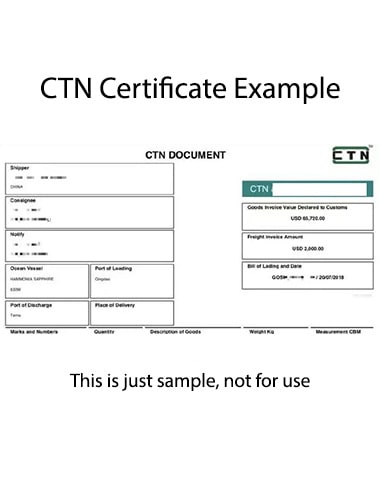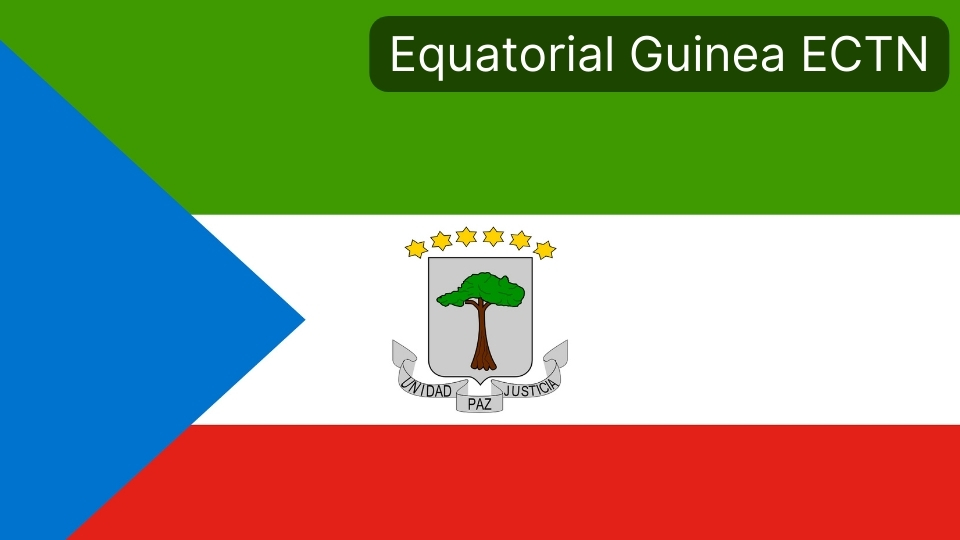What is CTN?

The Cargo Tracking Note (CTN), synonymous with the Electronic Cargo Tracking Note (ECTN), is a pivotal digital document required for international shipping to specific African countries. It functions as a pre-shipment verification mechanism, encapsulating comprehensive details about the cargo, such as its origin, destination, and intended transit route. Essential for customs clearance, the CTN plays a crucial role in facilitating the smooth movement of goods, enabling customs authorities to efficiently monitor, manage, and enforce import regulations.
The terminology for these certificates varies across West African and French-speaking countries. While commonly referred to as CTN, French-speaking countries know it as BSC (Bordereau de Suivi de Cargaison) and BESC (Bordereau Électronique de Suivi de Cargaison).
Understanding the Cargo Tracking Note (CTN)
The CTN is a mandatory document for shippers, freight forwarders, and importers/exporters engaged in transporting goods to several African countries. It serves as a pre-shipment verification tool that provides detailed information about the cargo, its origin, destination, and the route it will take. This documentation is vital for customs clearance and aids in monitoring and managing cargo, ensuring compliance with import regulations of the destination country.
Which Countries Use the CTN Certificate?
- Angola, CNCA Certificate
- Benin, BESC Certificate
- Burkina Faso, ECTN Certificate plus URN
- Burundi, ECTN Certificate
- Cameroon, BESC Certificate
- CAR (Central African Republic), ECTN Certificate
- Chad (Republic of Chad), ECTN Certificate
- Democratic Republic of Congo (D.R. of Congo), F.E.R.I Certificate
- Equatorial Guinea, ECTN Certificate
- Gabon, Bietc Certificate
- Ghana, CTN Certificate
- Guinea Bissau, CEE Certificate (ECTN)
- Guinea Conakry, ECTN Certificate
- Ivory Coast (Cote d’Ivoire), BSC Certificate
- Liberia, CTN Certificate
- Libya, ECTN Certificate
- Madagascar, BSC Certificate
- Mali, BSC Certificate
- Niger, BSC Certificate
- Nigeria, ICTN Certificate
- Congo (Republic of), ECTN Certificate
- Senegal, BSC and BESC Certificate
- Sierra Leone, ENS and BSC Certificate
- South Sudan, ECTN Certificate
- Togo, ECTN Certificate
Getting a CTN in 7 Steps
Obtaining a CTN certificate involves a series of steps to ensure the process is completed accurately and in compliance with the regulations of the destination country. Here is a step-by-step guide to acquiring a CTN certificate:
-
Gather Required Documents: Begin by collecting all necessary documents for your shipment. These typically include the commercial invoice, bill of lading, freight invoice, and packing list.
-
Identify the Authorized Issuing Agency: Determine the authorized agency or body designated by the destination country’s government to issue CTN certificates. This information can usually be found on the official website of the destination country’s customs authority or by contacting your freight forwarder.
-
Submit Application and Documents: Once you have identified the authorized agency, submit your CTN application along with the required documents. This submission can often be made online through the agency’s platform or via email.
-
Pay the CTN Fee: After submitting your application and documents, you will be required to pay a fee for the issuance of the CTN certificate. The fee structure varies depending on the destination country and the authorized agency.
-
Document Verification: The issuing agency will review and verify the documents submitted to ensure they meet the destination country’s regulations and requirements. This step involves checking the accuracy and completeness of the information provided.
-
Receive Your CTN Certificate: Once your application and documents have been verified and the fee has been paid, the issuing agency will generate and provide you with the CTN certificate. This certificate is typically sent via email in a digital format.
-
Attach CTN Certificate to Your Shipment Documents: Finally, ensure that the CTN certificate is included with your shipment’s documents. This will be required for customs clearance upon arrival at the destination country.
By following these steps, shippers can successfully obtain a CTN certificate, ensuring compliance with the import regulations of the destination country and facilitating a smoother customs clearance process.
What Happens If You Don’t Have a CTN Certificate
The absence of a CTN certificate can lead to significant disruptions in the shipping process. Without this document, cargo may be denied entry into the destination country, resulting in delays, additional storage charges, and potential fines. Moreover, the lack of a CTN undermines the customs authorities’ ability to effectively monitor and regulate cargo, posing risks to national security and compliance with trade regulations.
Issuing Authorities of the CTN
The responsibility for issuing a CTN certificate lies with designated agencies or bodies authorized by the government of the destination country. These entities are tasked with verifying the submitted documentation against the shipment details and ensuring that all required information is accurate and complete. It’s crucial for shippers and exporters to identify and engage with the authorized agent well in advance of their shipment to avoid any potential issues.
Importance of the CTN in International Trade
The CTN plays a crucial role in enhancing the efficiency and security of international trade, particularly for countries with stringent import regulations. By providing a transparent overview of cargo movements, it helps to prevent fraud, smuggling, and other illicit activities. Additionally, the CTN facilitates faster customs clearance, reducing waiting times at ports and thus, expediting the delivery of goods.
Key Documents Required for CTN Application
To apply for a CTN certificate, applicants must prepare and submit several key documents. These typically include the commercial invoice, bill of lading, freight invoice, and packing list. Each document contributes to the comprehensive overview of the shipment, ensuring that all cargo details are transparent and traceable. Each country has its own set of required documents for a CTN. Click here to discover the documents needed for a specific country’s CTN.
What Does BSC Stand For?
BSC originates from “Bordereau de Suivi des Cargaisons,” serving as an acronym for CTN. It is also humorously noted that BSC stands for Bachelor of Science Certificate, but it is predominantly recognized as a customs clearance document.
What Does BESC Mean?
BESC signifies Bordereau Électronique de Suivi des Cargaisons, a certificate for shipping/customs clearance.
What Does the CNCA Certificate Stand For?
CNCA represents Conselho Nacional de Carregadores, mandatory for Angolan customs clearance since 28/01/1994 (Decree no. 19/94).
What is the Bietc Certificate?
BIETC is an acronym for the Gabonese Authority of Customs’ Bordereau d’Identification Électronique de Traçabilité des Cargaisons, specific to Gabon.
What Does the CEE Cargo Tracking Note Stand For?
Certificado Eletrónico de Embarque (CEE) has been the mandatory loading document for Guinea Bissau since 8 Aug 2011, also known as the CTN Certificate.
What is ECTN?
ECTN, or Electronic Cargo Tracking Note, is synonymous with the BESC Certificate.
What is the ICTN Certificate?
ICTN Certificate is a loading document exclusively required for shipments to Nigeria.
Stay updated with our daily Cargo Tracking Note Category updates.






